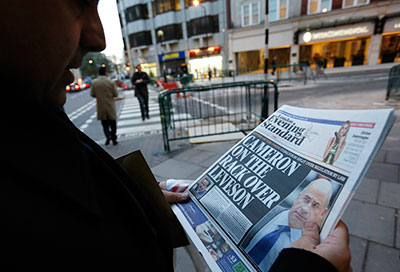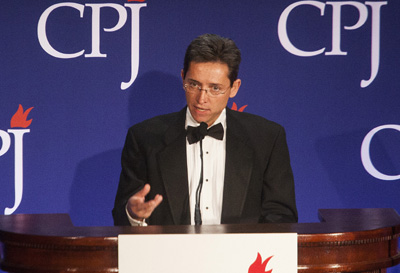UK urged to reconsider post-Leveson media proposals
Dear Prime Minister Cameron: You recently spoke out in defense of press freedom in Africa by raising the case of an imprisoned Somali journalist when you met with Somali President Hassan Sheikh Mohamud. The journalist was subsequently released. The moral authority of a British prime minister to mount such a defense stems in part from Britain’s history of nearly 300 years without government regulation of the press.

In UK, medieval tactics may save modern media
The long-awaited reform of libel laws in the United Kingdom skirted with collapse this week due to political infighting in the aftermath of the Leveson report on media ethics–the public inquiry that resulted from the News Corp. phone-hacking scandal. With that disaster narrowly averted, attention has turned to what may turn out to be a…
Attacks on the Press in 2012: United Kingdom
The Leveson inquiry, begun in 2011 after revelations of phone-hacking and other ethical lapses by the press, drew to a close with the issuance of a lengthy report that proposed the creation of an independent regulatory body backed by statute. Critics, including CPJ, warned that statutory regulation would infringe on press freedom; Prime Minister David…

In Syria, the quandary of freelance news coverage
Forces on all sides of the Syrian conflict that have tried to censor news coverage through violence have won a round. By sharply increasing the risk for reporters covering the civil war they have forced news organizations to think twice before sending their staff to the battlefields. In a worrying development they even have led…

Setback in O’Hagan murder must not mean case closed
More than 11 years have passed since investigative journalist Martin O’Hagan was murdered near his home in Lurgan, Northern Ireland, and the case has not been solved. Last week Northern Ireland’s public prosecutor announced a major setback to the case that has colleagues worried it never will be.
UK should press Somalia on journalist’s jailing, murders
Dear Prime Minister Cameron: In anticipation of your meeting with Somali President Hassan Sheikh Mohamud next week, we would like to bring to your attention recent actions taken by the Somali government, as well as the increasing number of unsolved journalist murders in the country.

Two journalists attacked in a week in Northern Ireland
London, December 19, 2012–The Committee to Protect Journalists is alarmed that two attacks against journalists in Northern Ireland have taken place over the past week. On Friday, a pipe bomb was left at the door of the home of freelance press photographer Mark Pearce. On Monday, Adrian Rutherford, a reporter with the daily Belfast Telegraph,…

Awardees say indignation trumps intimidation
The battle for a free press sometimes feels like a war between indignation and intimidation. Journalists learn of abuses of power, crime, or corruption, and–indignant–they speak out. In response, the perpetrators of those abuses–be they government officials or criminals–try to intimidate the journalists into silence with threats, lawsuits, jail, or even murder. Last night, the…